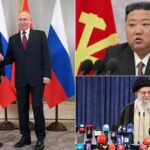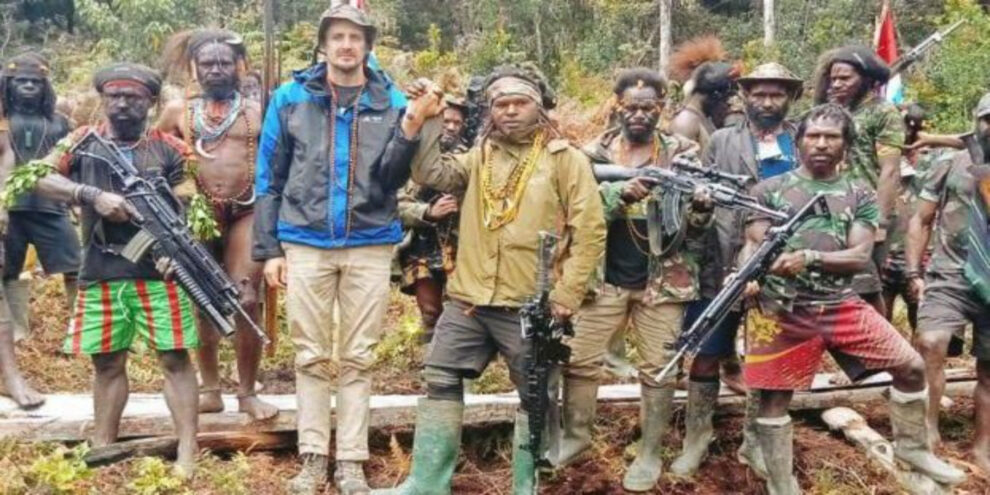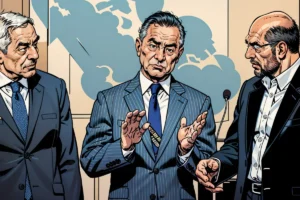The spokesperson for the West Papua National Liberation Army-Free Papua Organization (TPNPB-OPM) stated that the group would not shoot dead the Susi Air pilot from New Zealand — even though he had threatened to kill the hostage on July 1, 2023.
However, the group still urges the Indonesian government to negotiate directly with them regarding the release of Philip Max Merhtens.
This confirmation was made after there were fears that the hostages would be killed within two months if there was no common ground for negotiations.
The Susi Air pilot has been held hostage for five months since the TPNPB-OPM group burned the Susi Air plane at the Paro District Airfield, Nduga, Papua Mountains, on 5 February 2023.
Two months ago, the TPNPB-OPM leadership released a video in which they stated that they would shoot the pilot if the Indonesian government did not respond to the conditions they made.
However, in a recent interview with BBC News Indonesia, the spokesman for TPNPB-OPM, Sebby Sambom, said that his party would continue to guarantee the safety of the pilots.
Sebby said that the TPNPB-OPM leader, Egianus Kogoya, had agreed not to shoot the pilot.
“He was held as a friend, not an enemy. We will protect him, we must protect the pilot like an egg,” Sebby told BBC News Indonesia on Friday (30/6).
This guarantee was conveyed as a form of their seriousness to negotiate with the Indonesian government and the New Zealand government.
Sebby also expressed the group’s desire to negotiate with the party appointed by President Joko Widodo.
“We have a team of facilitators and negotiators to [go] to Jakarta too. Then, we will ask for [teams] from New Zealand. And now we are proposing a neutral state party,” said Sebby.
The attitude shown by TPNPB-OPM by ensuring the safety of pilots who were taken as hostages was positively welcomed by Amnesty International, which considered this statement as a positive development in efforts to release pilots.
“That is a positive development that the government can further develop to explore initial meetings towards a peaceful settlement,” said Director of Amnesty International Indonesia, Usman Hamid.
According to Usman, the government needs to open itself up to carry out an inclusive dialogue, not only with parties from Papua who are pro-government, but also those who voice aspirations for Papuan independence.
“If it’s only with pro-government [parties], what needs to be dialogued on? Because there is no conflict. Resolution is necessary to end a conflict,” he added.
Contacted separately, the Expert Staff Office of the President, Theofransus Litaay, stressed that the government had not been contacted by the TPNPB-OPM negotiating team which Sebby claimed had been sent to Jakarta.
“There is no negotiating team. Who dares to admit they are the KKB negotiating team or the Papuan separatist network? Who dares to say that he represents this group of hostage takers?”
Even so, Theo ensured that communication with the TPNPB-OPM continued through intermediaries from traditional leaders, community leaders and the provincial government.
‘We will free him because he is not an enemy’
TPNPB-OPM spokesperson, Sebby Sambom, emphasized that the New Zealand pilot would not be shot dead by the group.
However, the release of the pilot will only be carried out on condition that the Indonesian government agrees to sit at the negotiating table with the TPNPB-OPM.
“We will release them as soon as possible, now it’s just [waiting] for Jakarta and New Zealand. We are waiting for them to negotiate with us or not [regarding] the release of the pilots.
“No reason. Like it or not, Jakarta must [want to negotiate]. New Zealand too, we have to talk. Then we will release the pilot peacefully,” said Sebby.
Furthermore, he said that the TPNPB-OPM had prepared a negotiating team to negotiate with Jakarta on pilot release.
In fact, he admitted that the TPNPB-OPM had sent a team to Jakarta to meet President Joko Widodo in person. This is because they asked their representatives to negotiate directly with the negotiating team appointed by the government.
“We are ready. We have a team of negotiators. So this month we have triangular meetings. Anyway from a political, civil, and military perspective. We have decided that we are ready to become negotiators to negotiate pilot freedom,” said Sebby.
A Susi Air pilot named Philip Max Mehrtens has been held hostage by TPNPB-OPM since last February.
Over the past five months, the Papuan Police and the TNI have been trying to locate the group and free the pilot.
However, this liberation effort is not easy. This problem also triggered several incidents of armed clashes that killed a number of TNI members and civilians.
The TPNPB-OPM group continues to urge the Indonesian government to involve New Zealand or other international parties to become third parties in discussing Papuan independence.
However, the desire for dialogue between the two parties has not been realized. This is because the Indonesian government has repeatedly rejected the demands of TPNPB-OPM which linked the release of the Susi Air pilot to the issue of independence.
Later, TPNPB-OPM threatened to kill the pilot if Jakarta refused the offer of negotiations. This statement elicited responses from various observers on the issue of Papua and human rights activists.
One of them is Amnesty International which calls for the pilot to be released immediately and unconditionally because it violates basic human rights principles.
In fact, a number of church representatives and bishops in Jayapura, Papua, offered to become mediators with armed groups in order to free the Susi Air pilot.
But while there have been various options for conflict resolution, so far there has been no real negotiations.
Amnesty International: There needs to be openness from the Indonesian government’s side
Director of Amnesty International Indonesia, Usman Hamid, said that the path of peace dialogue could be the best solution in resolving the armed conflict that occurred in Papua.
“Actually, the biggest hope of many Papua observer forums and leaders in Papua is for the government to sit down with pro-independence groups to carry out some kind of exploratory dialogue or meeting towards a peaceful settlement,” Usman told BBC Indonesia, Friday (30/6).
According to Usman, this solution requires openness from the Indonesian government, especially from the Ministry of Politics, Law and Security, Ministry of Foreign Affairs.
Although he is aware that the government is reluctant to involve the international side, he feels this should not be a barrier in initiating dialogue.
“I think this risks the credibility of the Indonesian government in the eyes of the world community, many of whom are actually wondering what the Indonesian government is doing to defuse and resolve the armed conflict in Papua and release the pilot,” he said.
However, he also said that the TPNPB-OPM had violated international humanitarian law which prohibited the practice of taking hostages.
“Therefore, actually the process of releasing the New Zealand pilot cannot be carried out with conditions,” said Usman.
Overall, Usman hopes that the two sides can be brought together in a peace dialogue, so that the conflicts that have been going on for the last three to four years can be thoroughly resolved.
“In Papua, the armed conflict is already in the exceptional circumstances stage and is actually heading for stalemate. So there must be a breakthrough, there must be a pause to reorganize the entire government policy system in Papua through these dialogues.”
Expert Staff Office of the President, Theofransus Litaay, emphasized that the government continues to communicate with the TPNPB-OPM group through local government intermediaries, religious leaders and traditional leaders.
“The government has never refused to negotiate. The government continues to communicate with the hostage-takers. But it is not clear from the hostage taker what the pilot is up to. He didn’t talk about setting up a forum on independence,” Theo told BBC News Indonesia.
Until now, he continued, there had not been a negotiating team from TPNPB-OPM who had declared themselves and asked to meet with representatives of the Indonesian government.
Furthermore, he said that the Susi Air pilot hostage had had a widespread impact, especially for the people in Papua who were waiting for the delivery of basic necessities.
Because, since the incident, many companies have not dared to send planes to the Nduga region.
“The government is experiencing difficulties, because air transportation is limited. We want to send food and other materials, medicines, materials for offices, education, schools so we can’t.”
Theo stated that the government remained firm in their position, that the pilot must be released unconditionally.
“Currently negotiations are underway in order to release the hostages. Then it’s been running. Because pilot safety is the main thing, “said Theo.
Previously, the Papua Police Chief Inspector General Mathius Fakhiri said the Regional Police were ready to fulfill the demands of the TPNPB-OPM for the release of the pilots, except for ‘independence’ and weapons.
“It is impossible for us to grant both requests, but the money requested will be prepared and handed over to Egianus Kogoya, the origin of the New Zealand hostage being released and handed over to the security forces,” said Mathius, as quoted by the Antara news agency, Thursday (29/2019). 6).
He explained that currently negotiations with TPNPB-OPM were still being carried out involving various parties, including the Egianus Kogoya family.
“We hope that Egianus will not carry out his threat, namely shooting the Susi Air pilot on July 1,” said Fahiri while expressing his hope that his family could help convince Egianus not to execute his captives.
Meanwhile, the violent conflict in Papua continues to be related to the aspirations for independence which are still being voiced by several factions among the Papuan population.
This conflict claimed the lives of not only the TPNPB-OPM, but also the TNI and civilians.
According to Amnesty International Indonesia’s report for the 2018-2022 period, there were at least 94 cases of extrajudicial killings involving TNI, Polri, prison officers and Papuan pro-independence groups that killed at least 179 civilians.
The number of victims who died from the TNI was 35 people from 24 cases of extrajudicial killings, nine members of the Police from eight cases, and 23 members of the Papuan pro-independence group from 17 cases.
The central government has responded to the Papuan people’s demands for independence by implementing special autonomy in the area since 2000. However, not all Papuans accept the special autonomy policy because it is considered that it has not granted their wishes.
Recently, the special autonomy policy has been criticized after claims emerged that special autonomy funds (Otsus), more than the trillions of special autonomy funds (Otsus) disbursed by the central government, were not utilized for the welfare of the people of Papua.
Even in 2018, the Chairman of the Papuan People’s Council said that the tens of trillions of rupiah disbursed each year had no impact on the welfare of indigenous Papuans.
Source : BBC















